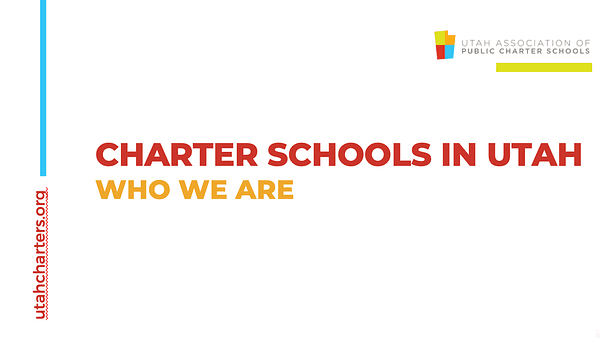Utah Charters at a Glance
Icon
85,204 Students
Icon
151 Charter Schools
Icon
5200 Educators
FAQ Charter Schools
Are charter schools public schools?
Yes, charter schools are independently-operated, public schools. Charter schools provide a high-quality education option to public school students, upholding the high standards that parents and teachers expect.
Who supports charter schools?
Charter schools enjoy widespread support from parents, teachers, community leaders, and both Republican and Democrat elected officials across the country. In many places, charter schools are part of the close-knit fabric of the community.
How do charter schools work?
Charter schools are public schools operating under an independent contract or “charter” with an authorizer, typically, the State Charter School Board or USU’s Center for the School of the Future. The charter provides the school with operational autonomy to pursue specific educational objectives regarding curriculum, staff, and budget.
Do charter schools charge tuition?
No, charter schools are tuition-free, public schools.
How do I enroll my child in a charter school?
Most charter schools have an enrollment period when parents can submit applications for the school; typically that enrollment period starts as early as November and runs through March or April. If there are more applications submitted than seats available, they will hold a randomized blind lottery. If the school has space available, some schools accept enrollment applications year round.
Do charter schools have attendance boundaries?
Charter schools do not have traditional school boundaries like district schools. You can find links to the charter schools in your area on our website.
Are charter schools nonprofit?
Utah charter schools must be nonprofits. Like district schools, they rely on private companies for a variety of services, from legal work to HR/payroll to accounting and beyond.
Do charter schools have admission requirements?
No, charter schools do not have admission requirements or entrance exams. Many charter schools are in high demand. When that demand exceeds the spaces available in the school, a charter school hold a randomized, blind lottery to determine which students are admitted.
What are some questions to ask when I’m choosing a charter school?
As a parent, make sure you are familiar with the individual objectives and rules affiliated with the specific charter school that you are considering before you enroll your child. The reasons that parents choose charter schools for their children are just as unique as the students themselves. They choose their child’s school for a variety of reasons including strong, dedicated teachers, the school's focus matches their child’s needs, or simply because their child was struggling in their neighborhood district school. Charter schools provide families with options in public education, allowing parents to take a more active role in their child’s education.
What is a charter school authorizer?
Authorizers are the institutions that decide who can start a new charter school, set expectations, oversee school performance and decide which schools should continue to serve students or not.
What makes charter schools different than other schools?
Each of Utah’s more than 115 charter schools is unique – both inside and out. Some focus on college prep; some follow a Montessori curriculum; still others integrate the arts or athletics into each subject. Some charter schools require uniforms, others have longer school days, and some teach their entire curriculum in two languages. The possibilities are endless, but charter schools aim to provide a range of options so that parents can choose the school that best fits their child.
How can I start a charter school?
Charter schools can be started by any interested party, including parents, community members, and teachers. Former teachers who wanted to take the lessons they learned in the classroom and scale to an entire school community sometimes start a school. It is helpful to first identify a unique need in the community that the charter school would serve and connect with either the State Charter School Board or USU’s Center for the School of the Future.

Click on volume control to unmute video.


